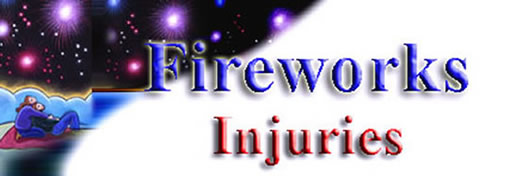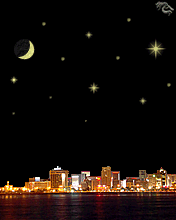The American traditions of parades, cookouts, and fireworks help us celebrate the summer season, especially our nation's birthday on the Fourth of July. However, fireworks can turn a joyful celebration into a painful memory when children and adults are injured while using fireworks. Although legal consumer fireworks that comply with the CPSC regulations can be The following are examples of injuries from legal and illegal fireworks: A 52-year-old man lit an artillery shell type of firework with a large fuse. Either he did not move away from it in time, or he came back to check it after it was lit. The device exploded near the victim's face and his shirt caught on fire. The victim experienced first and second degree burns to about 40 percent of his body. He was taken to the hospital and later developed an infection. He died almost three weeks after the incident. A 19-year-old female lit a firework that was supposed to shoot into the air. Instead, the firework exploded, shattering the lens of her glasses and burning the skin around her eye. The victim was treated at an emergency room and then released.
A 27-year-old man picked up about 30 sparklers and began to light them for children in the neighborhood. Several of the sparklers exploded, according to the victim, resulting in first degree burns to his hand. He was treated at an emergency room and released. To help prevent incidents like these, the federal government, under the Federal Hazardous In a regulation that went into effect December 6, 1976, the U.S. Consumer Product Safety Commission lowered the permissible charge in firecrackers to no more than 50 milligrams of powder. In addition, these amended regulations provide performance specifications for fireworks other than firecrackers intended for consumers use, including a requirement that fuses burn at least 3 seconds, but no longer than 9 seconds. All fireworks must carry a warning label describing necessary safety precautions and instructions for safe use. The Commission has issued a performance requirement to reduce the risk of potentially dangerous tipover of large multiple tube mine and shell devices. Tip-over of these devices has resulted in two fatalities. The U.S. Consumer Product Safety Commission still estimates that in 2004 about 9,600 people were treated in hospital emergency rooms for injuries associated with fireworks. Over half the injuries were burns and most of the injuries involved the hands, eyes, and head. About half of the victims were under 15 years of age. Fireworks should be used only with extreme caution. Older children should be closely supervised, and younger children should not be allowed to play with fireworks.Before using fireworks, make sure they are permitted in your state or local area.
* Do not allow young children to play with fireworks under any circumstances. Sparklers, considered by many the ideal "safe" firework for the young, burn at very high temperatures and can easily ignite clothing. Children cannot understand the danger involved and cannot act appropriately in case of emergency. * Older children should only be permitted to use fireworks under close adult supervision. Do not allow any running or horseplay. * Light fireworks outdoors in a clear area away from houses, dry leaves or grass and flammable materials. * Keep a bucket of water nearby for emergencies and for pouring on fireworks that don't go off. * Do not try to relight or handle malfunctioning fireworks. Douse and soak them with water and throw them away. * Be sure other people are out of range before lighting fireworks. * Never ignite fireworks in a container, especially a glass or metal container. * Keep unused fireworks away from firing areas. * Store fireworks in a dry, cool place. Check instructions for special storage directions. * Observe local laws. * Never have any portion of your body directly over a firework while lighting. * Don't experiment with homemade fireworks. PARENTS SHOULD SUPERVISE THE ORDERING AND USE OF MAIL-ORDER "MAKE YOUR OWN" FIREWORK KITS AND COMPONENTS. MAIL-ORDER KITS AND COMPONENTS DESIGNED TO BUILD BANNED FIREWORKS ARE ALSO PROHIBITED. Please distribute and share this information and help your children to understand the risk by visiting The U.S Consumer Product Safety Commission This Second part Source: The U.S. Consumer Product Safety Commission, Fireworks Safety Web Site/Fireworks Safety Fact Sheet http://www.cpsc.gov/CPSCPUB/PUBS/july4/4thjuly.html First part-Link Sources:Sources: CDC http://www.cdc.gov/ncipc/duip/spotlite/firework_spot.htm and Greene MA, Joholske J. 2004 Fireworks annual report: Fireworks-related deaths, emergency department treated injuries, and enforcement activities during 2004. Washington (DC): U.S. Consumer Product Safety Commission; 2005 [cited 12 May 2006]. Available at URL: www.cpsc.gov/LIBRARY/2004fwreport.pdf. |
|
Salud + Health Info is for information and educational purposes only. You should not rely on this information as a substitute for personal medical attention, diagnosis or hands-on treatment. If you are concerned abut your health or that of a child, please consult your family’s physician or health provider immediately and do not try to diagnose yourself. Copyright © 2001-2011 Info Option Network |
|
 info
info
The first, the best & the only English & Spanish Magazine in San Diego, California
| Esta página en Español | |
Let's enjoy nights illuminated by fireworks ....During the summer nights, even though the 4th of July has passed, we will continue to see firework shows that burst into colorful sparks. The Home Safety Council urges families urges families to enjoy fireworks the safer way, by attending locally sanctioned fireworks shows presented by professionals who adhere to safety codes. |
|
| Better be Safe than Sorry With the Sun | |
| Sun Safety | |
| Extreme Heat!!! | |
| Health Officials Warn of Dangers of Hot Vehicles | |
| A “Cool” Place to Stay Cool during a heat wave | |
| A “Cool” Place to Stay Cool during a heat wave ( in PDF format) | |
| County Urges to Take Precautions in Hot Weather | |
| SummerTips for healthy skin | |
| Home Fire Safety | |
What You Should Know About Melanoma ....Melanoma is the most serious of the common type of skin cancer. The good news is that most melanomas can be found early and treated successfully. This brochure from the American cancer Society describes risk factors for this type of skin cancer, and important tips for finding it early. |
|
| More information related | |
| Summer vision care | |
| Food Poisoning | |
| Why to Avoid Dehydration? | |
| Safety Around the Water | |
|
|


